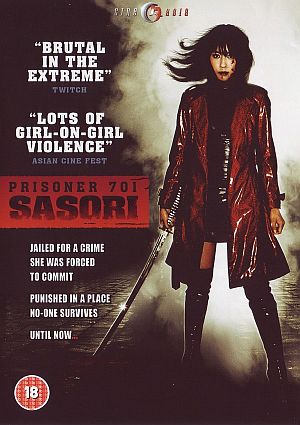★★★
“Women with balls.”
 Every four years, when the Olympics arrive, we fall in love with handball. What is handball, you might be asking. Basically, think seven-a-side soccer, except (obviously), played with the hands rather than feet. It’s an amazing sport, all but unknown in the UK and US, and deserving a far wider audience – a YouTube search for “Olympics handball” will get you sorted. Which is why we were fascinated by the idea of a film focusing on it, specially, the story of the 2004 South Korean women’s team. What they did was roughly that country’s equivalent of the 1980 ‘Miracle on Ice’. The once-dominant Korean team had fallen far from grace, and barely qualified for the Athens Olympics. But they reached the final, against the Danish side, which went into double overtime, and then a penalty shootout.
Every four years, when the Olympics arrive, we fall in love with handball. What is handball, you might be asking. Basically, think seven-a-side soccer, except (obviously), played with the hands rather than feet. It’s an amazing sport, all but unknown in the UK and US, and deserving a far wider audience – a YouTube search for “Olympics handball” will get you sorted. Which is why we were fascinated by the idea of a film focusing on it, specially, the story of the 2004 South Korean women’s team. What they did was roughly that country’s equivalent of the 1980 ‘Miracle on Ice’. The once-dominant Korean team had fallen far from grace, and barely qualified for the Athens Olympics. But they reached the final, against the Danish side, which went into double overtime, and then a penalty shootout.
Yeah, much of this is a compendium of sports cliches, right down to the requisite training montage. The fact it’s largely based on true events does not exonerate the movie from criticism here, though I was impressed how closely the depiction of the final match did mirror the real thing, still regarded as an all-time classic contest. Thus, you get tropes such as the veterans, brought back for one last crack at glory, such as Han Mi-sook (Moon), who is now working in a grocery store to try and make ends meet, after her husband is defrauded by his business partner. They inevitably butt heads, both with the younger players, and new coach Ahn Seung-pil (Uhm), who is not only the replacement for interim coach Kim Hye-gyung (Kim J-e), but also her ex. There may eventually be bonding. I won’t spoil that.
It would be very easy for this to topple over into sentimental cliche, yet the strength of the performances generally help it stay just in bounds. Director Im seems particularly interested in developing her characters, and they come across as especially real, as they progress from a sparsely-attended opening game to the cauldron of the Olympic gold medal match. Especially memorable is the feisty Song Jung-nan (Kim J-y), who won’t back down from any confrontation, most notably when some of the other athletes at the Korean training complex try to bully some of her team-mates. Weightlifters or judokas, all learn quickly not to get in her way.
I should mention, you don’t need to know much about handball, since it’s largely self-explanatory. Though even our relatively untrained eye could detect the difference between the actresses playing the game, and their opponents who are the real thing, being actual professionals from a Danish handball club. For the Korean audience, there won’t be any surprises in the eventual outcome; that’s an area where the movie perhaps had a greater impact on us. Im handles the final moments particularly deftly, not even showing the final shot, just the reactions to it, and finishing with archive post-game interviews from the real participants. These do an excellent job of bringing home the reality of what happened.
At a length of over two hours, we could likely have done with more handball and less personal drama (not to mention the unfounded suggestion of biased officiating). Yet I’d be hard-pushed to consider the time wasted, and it was nice not to have to wait until 2020 to have our love of the game rekindled once more.
Dir: Im Soon-rye
Star: Moon So-ri, Kim Jung-eun, Kim Ji-young, Uhm Tae-woong





 The Milla Jovovich series are not the only films set in the Resident Evil universe. There have also been two feature-length computer animated movies: Degeneration was released in 2008, and Damnation four years later. A third, Vendetta, is scheduled to be released in Japan this spring. While made in Japan, with a Japanese director and crew, the voice cast are English-speaking. As with the novels, the stories and characters are in line with the universe of the computer games, rather than the live-action features, and tend to occupy spots in the timeline between the entries in the game series. Therefore, there’s no Alice, but the animated films contain their fair share of strong heroines and, of course, action.
The Milla Jovovich series are not the only films set in the Resident Evil universe. There have also been two feature-length computer animated movies: Degeneration was released in 2008, and Damnation four years later. A third, Vendetta, is scheduled to be released in Japan this spring. While made in Japan, with a Japanese director and crew, the voice cast are English-speaking. As with the novels, the stories and characters are in line with the universe of the computer games, rather than the live-action features, and tend to occupy spots in the timeline between the entries in the game series. Therefore, there’s no Alice, but the animated films contain their fair share of strong heroines and, of course, action. There’s a new EvilCorp in town, and its name is WilPharma, as we learn during the montage of news stories which opens this. In game terms, the film takes place after the events of “Resident Evil 4”, which saw the dismantling of the Umbrella Corporation. Its assets and research naturally proved too valuable to destroy, and WilPharma has taken over, with the announced goal of developing a vaccine for the troublesome T-virus. However, some dubious medical research in India leads to the company being targeted by protestors from TerraSave. It’s one such demo, at the Harvardville Airport, that kicks things off, as a plane of infected subjects crashes into the terminal, where Senator Davis is trying to avoid the protestors. TerraSave’s Claire Redfield (Court) finds herself trapped with the Senator, before they’re rescued by a team of soldiers including Angela Miller (Bailey) and Leon S. Kennedy (Mercier).
There’s a new EvilCorp in town, and its name is WilPharma, as we learn during the montage of news stories which opens this. In game terms, the film takes place after the events of “Resident Evil 4”, which saw the dismantling of the Umbrella Corporation. Its assets and research naturally proved too valuable to destroy, and WilPharma has taken over, with the announced goal of developing a vaccine for the troublesome T-virus. However, some dubious medical research in India leads to the company being targeted by protestors from TerraSave. It’s one such demo, at the Harvardville Airport, that kicks things off, as a plane of infected subjects crashes into the terminal, where Senator Davis is trying to avoid the protestors. TerraSave’s Claire Redfield (Court) finds herself trapped with the Senator, before they’re rescued by a team of soldiers including Angela Miller (Bailey) and Leon S. Kennedy (Mercier). Included here largely for completeness, since the action heroine content likely would fall a little short of qualification on its own. Not that it’s entirely lacking, as the video at the bottom shows. But it’s definitely more a vehicle for Leon S. Kennedy (Mercer/Dorman). Which brings me to one of the odd things here: that is not a typo, it’s a double-credit for the character, because two different actors played the role, one providing the voice, the other the source for the motion-captured animation. Not sure I’ve seen that before.
Included here largely for completeness, since the action heroine content likely would fall a little short of qualification on its own. Not that it’s entirely lacking, as the video at the bottom shows. But it’s definitely more a vehicle for Leon S. Kennedy (Mercer/Dorman). Which brings me to one of the odd things here: that is not a typo, it’s a double-credit for the character, because two different actors played the role, one providing the voice, the other the source for the motion-captured animation. Not sure I’ve seen that before.
 Stephanie (Powell) had been an assassin for the Italian Mafia, but had abandoned that life and settled down in London with her daughter. Years later, she is shocked to see her former lover, Alessandro (Canuso) show up at her job, and even more so when she gets an order she can’t refuse from her old employer, Franco (Gambino) – to kill Alessandro. Despite some qualms, not least how the family will react to her taking out one of their own, Stephanie carrier out the mission. But soon after, she finds herself being watched by the enigmatic Sam (Leese), who says he is there to protect her. Is that really the case, or does he have an entirely different purpose?
Stephanie (Powell) had been an assassin for the Italian Mafia, but had abandoned that life and settled down in London with her daughter. Years later, she is shocked to see her former lover, Alessandro (Canuso) show up at her job, and even more so when she gets an order she can’t refuse from her old employer, Franco (Gambino) – to kill Alessandro. Despite some qualms, not least how the family will react to her taking out one of their own, Stephanie carrier out the mission. But soon after, she finds herself being watched by the enigmatic Sam (Leese), who says he is there to protect her. Is that really the case, or does he have an entirely different purpose?
 Star Jill Kelly is an adult actress. I mention this, because it seems highly likely that most of her 300+ other works – perhaps The Butt Sisters Do Philadelphia or Sodomania: Slop Shots 5 – are likely better scripted, filmed, edited and generally well-made than this dreadful piece of crap. I should have known, given Donald G. Jackson’s involvement – he’s probably the worst film-maker I’ve ever had the misfortune to encounter, and I speak as someone fully familiar with the works of Ed Wood, Andy Milligan, J.P. Simon and Uwe Boll. They are all pretenders beside Jackson, and even though this barely runs an hour, your patience will be sorely tried. And by “tried”, I mean at the level where gnawing a limb off to escape will seems credible.
Star Jill Kelly is an adult actress. I mention this, because it seems highly likely that most of her 300+ other works – perhaps The Butt Sisters Do Philadelphia or Sodomania: Slop Shots 5 – are likely better scripted, filmed, edited and generally well-made than this dreadful piece of crap. I should have known, given Donald G. Jackson’s involvement – he’s probably the worst film-maker I’ve ever had the misfortune to encounter, and I speak as someone fully familiar with the works of Ed Wood, Andy Milligan, J.P. Simon and Uwe Boll. They are all pretenders beside Jackson, and even though this barely runs an hour, your patience will be sorely tried. And by “tried”, I mean at the level where gnawing a limb off to escape will seems credible.


 While sharing the heroine’s name with the renowned Female Convict Scorpion series, it’s not clear how much of an official remake this is: it’s supposedly based on a manga series, which I don’t quite recall being the case with its predecessors (it was a while ago I saw the original, though – must get round to re-viewing it for the site at some point soon). The concept is not dissimilar, however: Sasori (Mizuno) is sent to prison, where she is brutalized, but eventually escapes, and seeks vengeance on those who were responsible for putting her inside to begin with. However, it’s really poor at providing motive or explanation: for example, after Sasori is left for dead, her body is dumped outside the prison, where a corpse-collector (HK veteran, Simon Yam) rescues and revives her, before training her in the ways of top-end martial arts and sending Sasori on her way. Why? Who knows. Similarly, the reason why our heroine is in prison at all, raises more questions than it answers.
While sharing the heroine’s name with the renowned Female Convict Scorpion series, it’s not clear how much of an official remake this is: it’s supposedly based on a manga series, which I don’t quite recall being the case with its predecessors (it was a while ago I saw the original, though – must get round to re-viewing it for the site at some point soon). The concept is not dissimilar, however: Sasori (Mizuno) is sent to prison, where she is brutalized, but eventually escapes, and seeks vengeance on those who were responsible for putting her inside to begin with. However, it’s really poor at providing motive or explanation: for example, after Sasori is left for dead, her body is dumped outside the prison, where a corpse-collector (HK veteran, Simon Yam) rescues and revives her, before training her in the ways of top-end martial arts and sending Sasori on her way. Why? Who knows. Similarly, the reason why our heroine is in prison at all, raises more questions than it answers.